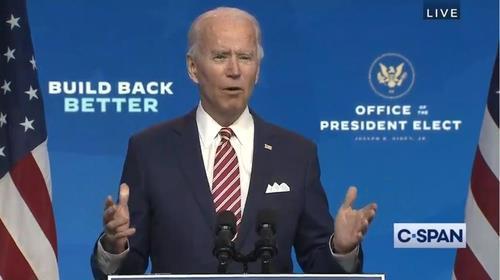 |
The captured image from the website of US cable news network C-Span shows US President-elect Joe Biden speaking at a press conference in Wilmington, Delaware, on Nov. 16. (C-Span) |
WASHINGTON -- South Korea's push for concessions to North Korea may continue to create tension in US-South Korea relations, a US congressional report said.
The updated Congressional Research Service (CRS) report on South Korea noted policy coordination between Seoul and Washington had been "inconsistent" under former US President Donald Trump.
President Joe Biden, on the other hand, is "reinvigorating the alliance, suggesting he would abandon President Trump's repeated use of punitive tariffs against allies like Seoul and his demand for a five-fold increase in South Korea's payments for the costs of hosting US troops," said the report, updated last Tuesday.
"Bilateral difficulties could surface, however, over North Korea policy. Moon's government favors easing sanctions against Pyongyang, a stance that could create tensions with Washington," it added.
Seoul is hoping the new US administration will quickly restart dialogue denuclearization talks with North Korea, which have stalled since February 2019 when the second US-North Korea summit between Trump and Kim Jong-un ended without a deal.
South Korean President Moon Jae-in has also said the issue of holding US-South Korea joint military exercises may be discussed with North Korea in advance after Kim cited the joint military drills as evidence of what he claimed to be US hostility toward the North.
"Moon generally favored offering more and earlier concessions to North Korea than Trump, creating periodic tensions, a dynamic likely to continue with the Biden Administration," the CRS report said.
The Biden administration earlier said it will first review its entire policy and approach toward North Korea to determine the best tools it can use while dealing with Pyongyang.
Secretary of State Antony Blinken said such tools may include additional sanctions, as well as incentives.
"Well, the first thing we're going to do is to review the policy across the board to look at what tools we have, including additional sanctions, including, especially, additional coordination and cooperation with allies and partners, but also to look at diplomatic incentives," he said earlier.
"So once we do that, we'll be able to tell you how we plan to move forward." (Yonhap)




![[Herald Interview] 'Trump will use tariffs as first line of defense for American manufacturing'](http://res.heraldm.com/phpwas/restmb_idxmake.php?idx=644&simg=/content/image/2024/11/26/20241126050017_0.jpg)

![[Health and care] Getting cancer young: Why cancer isn’t just an older person’s battle](http://res.heraldm.com/phpwas/restmb_idxmake.php?idx=644&simg=/content/image/2024/11/26/20241126050043_0.jpg)

